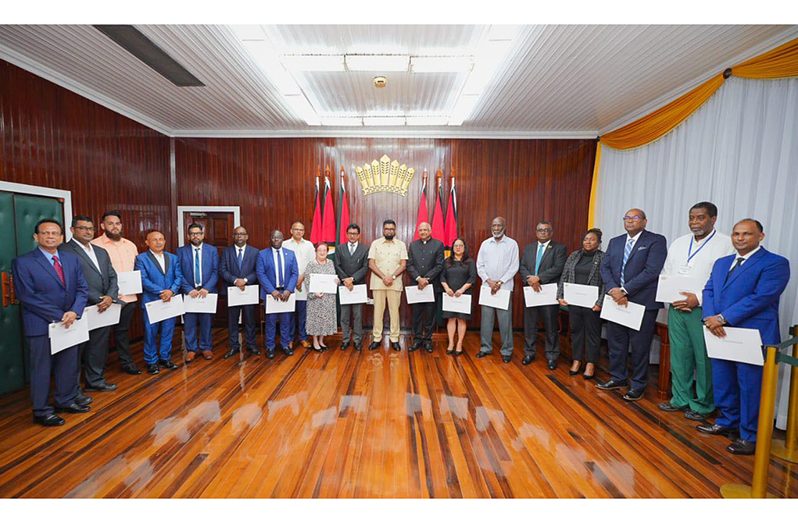–President Ali says, as diverse members of Constitutional Reform Commission sworn in
THE newly appointed members of the Constitutional Reform Commission (CRC) were sworn in on Wednesday, paving the way for enhanced democratic governance and more efforts to address evolving societal needs in Guyana.
President Dr. Irfaan Ali administered the oath of office to 17 of 20 members during the ceremony which was held at his Shiv Chanderpaul Drive office in Georgetown.
The CRC will be chaired by former Chancellor Justice Carl Singh. The commission is set to operate out of a building on Middle Street, Georgetown, previously used for various Commissions of Inquiry.
The Commission’s mandate, as outlined by President Ali, encompasses a wide array of areas critical for potential reforms, reflecting the dynamic nature of Guyanese society and the global landscape.
Members of the Commission are Attorney-General Anil Nandlall, S.C.; Parliamentary Affairs and Governance Minister Gail Teixeira; Health Minister Dr. Frank Anthony; Amerindian Affairs Minister Pauline Sukhai; and Minister within the Office of the Prime Minister, Kwame McCoy.
Representing the A Partnership for National Unity/Alliance For Change (APNU/AFC) Opposition on the Commission are Guyana Elections Commission (GECOM) Commissioner Vincent Alexander; economist Sherwood Lowe; Opposition Member of Parliament (MP) Ganesh Mahipaul; and Attorney-at-Law Nigel Hughes.
The Commission also includes representatives from various sectors, including Aslim Iqubal Singh from the Labour Movement; Derrick Rowan John from The National Toshao’s Council; Ramesh Anand Persaud from the Private Sector; Joycelin Kim Kyte-Thomas from Women Organizations; Daniel Josh Kanhai from Youth Organizations; Imran Ally from Muslim Organizations; Radha Krishna Sharma from Hindu Organizations; and Adrian V. Anamayah from among farmers.
ANUG’s General Secretary, Timothy Jonas, S.C. from the Joinder Parties; Kamal Ramkarran, representing the Guyana Bar Association and Keoma Griffith from Christian Organizations will be sworn in later since they were unavailable on Wednesday.
During his remarks at the swearing-in ceremony, President Ali underscored the pivotal role of a nation’s Constitution as its foundational law.
“A Constitution must remain a living document and not become archaic. It must possess the capacity for adaptation to be relevant and to effectively address new challenges, societal changes, and emerging issues while still upholding its core principles and protecting the rights of citizens,” the President said.
The Constitution Reform Commission Act 2022, passed by the National Assembly, delineates key areas for potential reforms, including fundamental rights, Indigenous Peoples’ rights, electoral reforms, and bolstering integrity in public office.
President Ali stressed the importance of these reforms in fostering greater political and social inclusion, stating: “Your ability to work together and achieve consensus will not only advance the cause of constitutional reform but also serve as an encouragement for greater political and social inclusion.”
The Commission, constituted with wide representation from various sectors including the ruling party, parliamentary Opposition, legal profession, labour movement, indigenous community, private sector, women, youth, religious community, and farmers, reflects Guyana’s commitment to inclusivity and democratic participation.
President Ali’s call for a proactive approach to constitutional reform reflects the changing dynamics of Guyanese society, where political, societal, and technological changes present new challenges and opportunities.
“The legitimacy of a nation’s Constitution stems from an agreed and lawful process of adoption, circumscribed by the consent of the governed. While ideally, a constitution should serve as a timeless blueprint for governance, reflecting enduring principles and values, the dynamic and evolving nature of societies and the world, necessitates periodic updates, refinements, and reforms to ensure the Constitution’s continued relevance and effectiveness,” he said.
He highlighted the necessity for clear and accessible language in the Constitution to ensure all citizens understand their rights and obligations, facilitating active participation in the democratic process.
“The Constitution must be drafted in clear and accessible language, comprehensible to the average individual.
“This ensures that all citizens can understand their rights and obligations, thereby facilitating active participation in the democratic process and reinforcing the mutual understanding between the government and the governed,” President Ali said.
In acknowledgement of the aforementioned principles, the President said that his assent to the Constitution Reform Commission Act 2022 on November 15, 2022, marked a significant step towards realising the collective aspirations of the Guyanese people.
The Commission’s formation signals a commitment to upholding the principles of democracy, protecting citizen rights, and promoting societal empowerment.
The members, entrusted with a weighty mandate, were urged by President Ali to approach their responsibilities with utmost diligence and dedication.
“I ask that you approach your responsibilities with utmost diligence and dedication. One expects each of you to discharge this mandate to the best of your abilities, striving to foster an atmosphere of cooperation and mutual respect during your deliberations.
“Rather than succumbing to animosity or rancour, it is imperative to acknowledge the significance of your work in shaping the future of constitutionalism in Guyana” the Head of State told the commissioners.
He reaffirmed the importance of fostering an atmosphere of cooperation and mutual respect during deliberations, urging the greater good of constitutional reform.
The appointment of the Constitutional Reform Commission comes at a critical juncture for Guyana, where the need for responsive governance and inclusive decision-making has never been greater.
President Ali’s leadership in initiating this reform process reflects a commitment to advancing democracy, strengthening institutions, and ensuring the Constitution remains relevant in the face of evolving societal challenges.
Several commissions have been appointed under his leadership including the Public Service Commission, the Police Service Commission, the Integrity Commission and the Judicial Service Commission, among others.
These commissions play crucial roles in various aspects of governance, such as making appointments, exercising disciplinary control, and ensuring compliance with human rights and anti-discrimination legislation.



.jpg)











